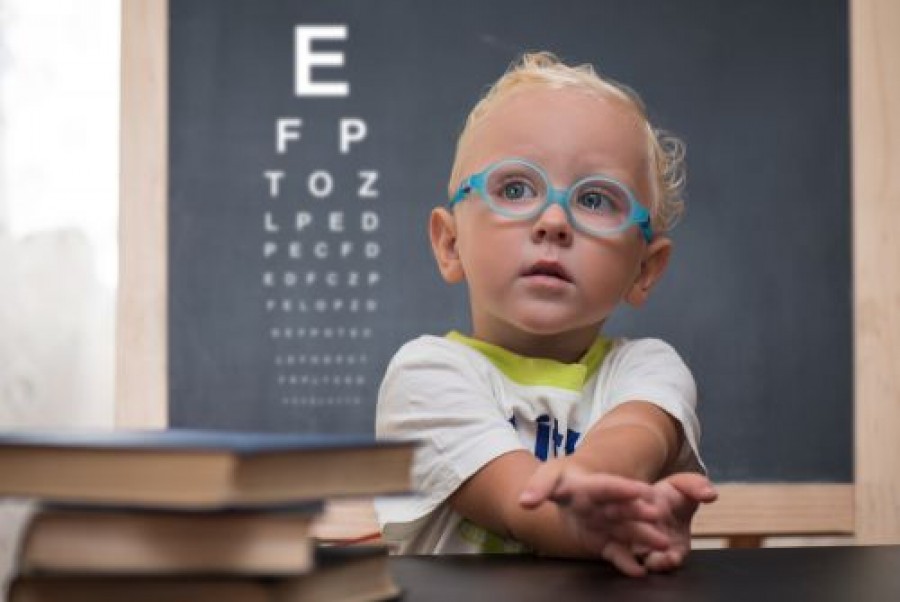How your baby’s hearing develops
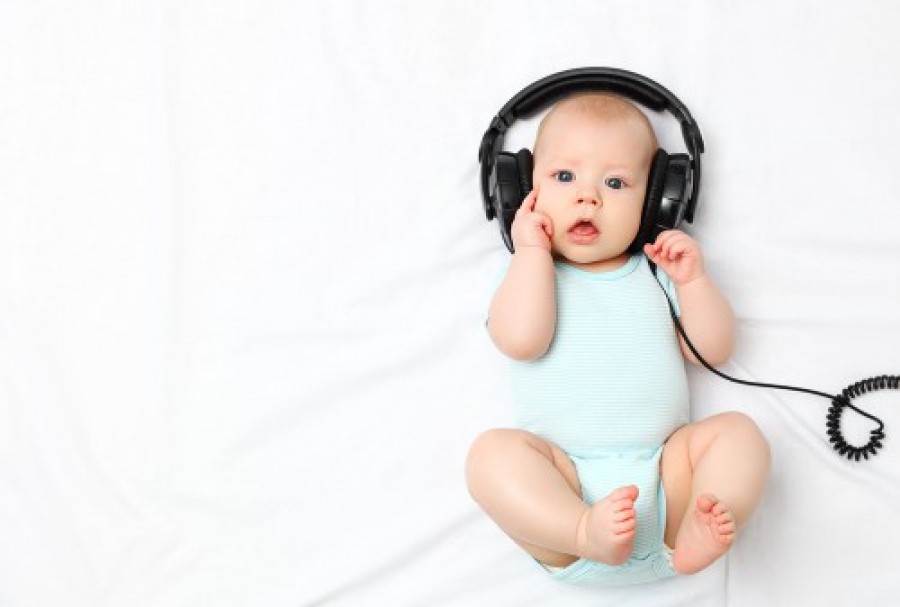
Babies can actually pick up a few sounds and noises while still in the womb, and are born with almost fully developed hearing. It doesn’t take long for their hearing to develop further after birth either. What might take them a little longer is working out the information that they pick up through hearing and what to do with it!
It’s exciting to watch your baby respond to new sounds, especially different types of music and watching as they process the sounds they’re hearing for the first time.
What can my baby hear when they’re in the womb?
Research has shown that babies can start to detect sounds while in the womb from quite an early stage during pregnancy. Their facial features are some the earliest things to develop, including their ears.
Some developmental stages of what your baby can hear while in the womb include:
- 9 Weeks Pregnant – Indentations develop on the sides of your baby’s head, where their ears will be
- 18 Weeks Pregnant – Your baby will start to detect muffled sounds
- 24 Weeks Pregnant – Your baby’s ears are almost fully developed and they are more sensitive to sounds
- 26 Weeks Pregnant – You will notice your baby becomes more responsive to sounds and in particular your voice
The most sound your baby will hear are the ones you don’t even pick up on yourself – the sounds of your body like your heartbeat and your lungs moving. By the time you reach your third trimester, your voice will be the most significant sound your baby detects and research has also shown that baby’s in the womb recognize and respond physically to the sound of their mother – including an increased heart rate and kicking!

What can my baby hear when they’re newborn?
Your baby’s hearing is almost fully developed at birth, and it’s through the sense of hearing that they’ll start to take in lots of information about their surroundings and home environment. You’ll probably notice that they are particularly responsive to your voice and react to loud noises – much like anyone else would!
Through listening and hearing, your baby’s brain development will also develop as they start to learn about the noises they hear around them and learn to make sense of what the information means:
- 0-2 months old – High pitched noises are particularly noticeable for your baby as their ears tend to be more sensitive to these types of noises as a result of being in the womb and hearing only deeper, muffled sounds.
- 3-4 months old – your baby will be more responsive to identifiable sounds such as your voice, nursery tunes, and other household noises such as the vacuum cleaner!
- 5-6 months old – your baby will have a more developed sense of where noises come from, they will look at you when they hear your voice and can usually identify their own name at this stage too. Try calling their name when they aren’t looking at you, or speaking about them, and watch as they turn to look at you.
Although your baby’s hearing develops when they are quite young, it’s important to have regular check ups as they grow and develop to ensure there are no underlying problems that need addressing. You doctor and midwife will arrange this, and many children also receive basic hearing tests once they start school.
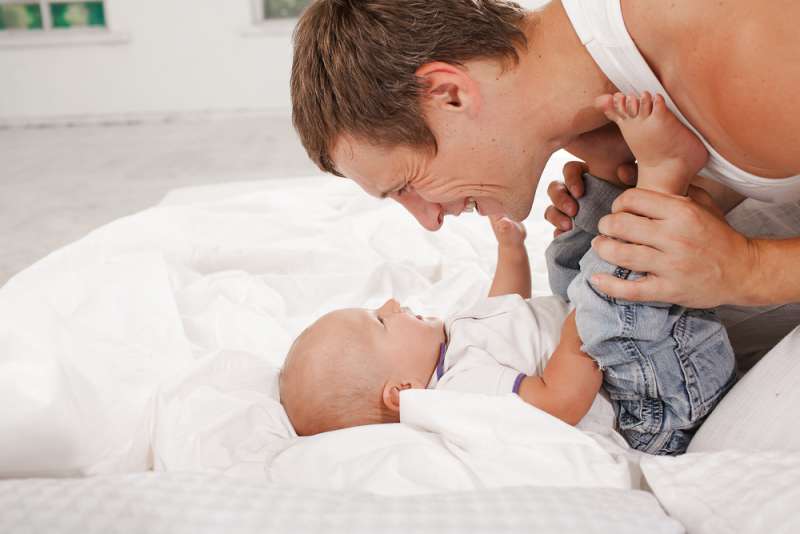
What can I do to support my baby’s hearing development?
There are many things you can do to support your baby’s hearing development, and help them to start to develop an understanding of different noises and sounds. These include:
- Singing nursery rhymes to them – the sound of your voice is one of the most noticeable sounds for your baby and nursery rhymes are particularly great with babies and children in mind because of the sounds they incorporate.
- Play different types of music – don’t feel restricted to just children’s songs or rhymes – all different music can help your baby’s hearing develop as they take in new sounds, instruments and beats.
- Introduce new sounds – as they grow and develop, try introducing new sounds to their environment to spark their interest – these can be anything musical baby toys to something as simple as homemade wind chimes made out of different materials. All these sounds will interest and amuse your baby, and aid their hearing and brain development.
- Read to your baby – again, the sound of your voice is very enticing for your baby and reading to them at any age will always help their development. Try using different voices and changing your tone and pitch to see how your baby responds and reacts to the changes in your voice. Learn more on the benefits of reading to your baby, here.
It’s through listening and watching you speak that your baby will first start to learn how to put sounds together. At around the 5 to 6 month mark, you will probably notice your baby paying more attention to your lips and mouth movements and trying to imitate easier sounds such as ‘m’ and ‘b’ sounding words.
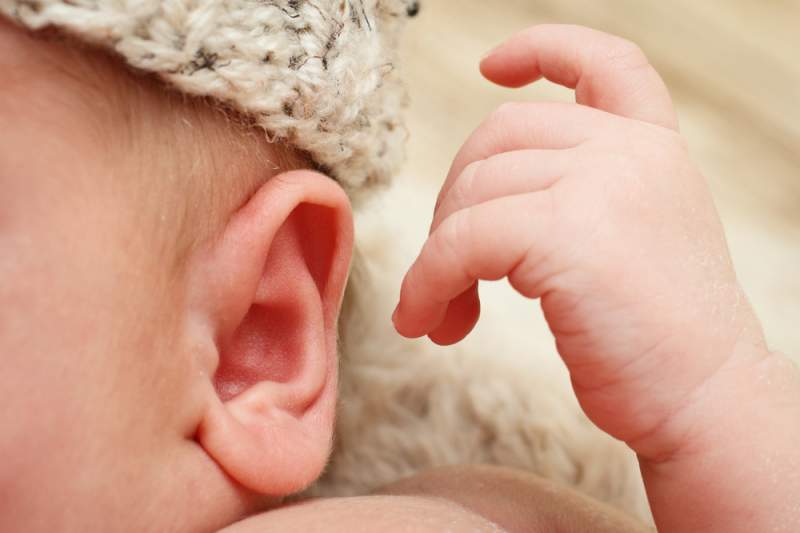
When should I be concerned about my baby’s hearing development?
Your baby’s ability to hear is closely linked to other areas of your baby’s brain development, and their ability to learn new information, so it’s important that any problems are identified early.
Many babies have the ability to sleep quite happily through noise, and this is perfectly normal and not a sign of any underlying problem – babies need their sleep for their growth and further development. But some babies will experience a hearing impairment and there are a number of factors that can contribute towards this including:
- If your baby was born prematurely
- If they had a disruption to their flow of oxygen during the birthing process
- If they experienced severe infections as a newborn
- If there is a history of hearing loss/impairment in the family
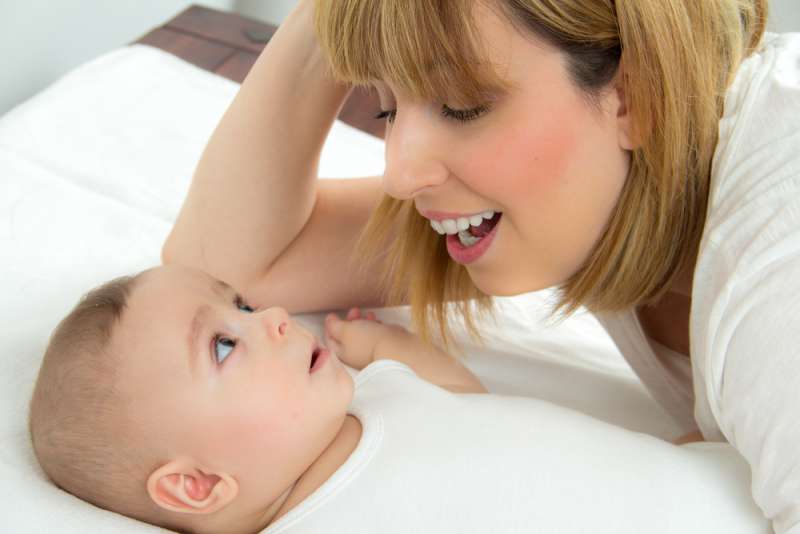
As mentioned earlier, all babies are given a simple hearing test as newborns, to check key hearing ability. As your baby grows it’s useful to know what signs to look out for so you can ensure your baby is re-tested if needed. Warning signs to look out for include:
- Newborn – 3 months – If your baby does not startle or jump at loud unexpected noises when they are awake
- 3-4 months – if your baby shows no engagement with sounds or noises
- 5-6 months – if your baby does not respond to your voice, seem to recognise your voice or respond to their name when called
- 6-8 months – if your baby does not attempt to make babbling noises and ‘speak’ in response to you talking to them
Generally, you are looking out for alertness and engagement from your baby with their surroundings and you. Identifying these problems early on makes a big difference in supporting other areas of your baby’s development, in particular around speech and learning language.
If you are concerned at all around your baby’s hearing development, speak with your doctor or midwife who can conduct further testing and make sure the necessary support is put in place.
Baby Developmental Milestones
How your baby’s eyesight develops


